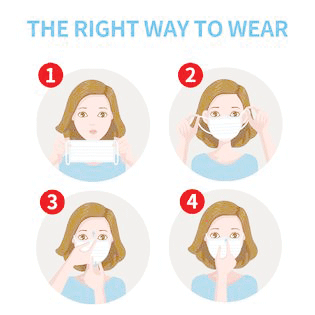PROTOCOL: Several countries have issued specific directions on what masks should be worn by whom and how they should be worn.
By Banjot Kaur
Several countries have issued directives on both the material used for making masks and the manner in which it should be worn. The most effective protection is offered by the N95 mask. Moreover masks are not a fashion statement and have to cover both the mouth and the nose so that droplets do not reach other citizens
Many countries around the world have imposed direct or indirect COVID-19 vaccine mandates, in addition to mask mandates. Are they necessary in a raging pandemic like this? Or do they infringe on our personal freedom to choose?
A lot of countries have clear-cut vaccine mandates that deny individuals entry to public places or offices, the use of government transport or even the right to hold certain jobs. According to the Institute for Government, a UK-based think tank, at least five countries have strict vaccine mandates: Germany, Greece, Italy, Indonesia and Austria.
In Indonesia, for example, the local government can fine any person who refuses a vaccine dose. She may also be denied social security benefits and government jobs. The Austrian and the German governments also have systems in place to impose fines.
In December 2021, Reuters reported that more countries are joining this list. In Micronesia, Tajikistan and Turkmenistan, for example, COVID-19 vaccines are mandatory for all individuals older than 18 years. In the same month, the Croatian parliament approved a heavy fine of about $4,600 (Rs 3.45 lakh) for those who refuse to get vaccinated.
Some other countries have vaccine mandates targeted at certain groups. In the US, all federal government employees have to be vaccinated, or they stand to lose their jobs. The Joe Biden administration also wanted to expand the mandate to all workplaces that employ more than 100 people, but the Supreme Court limited this expansion to just government-funded health facilities. Quite a few other countries have also imposed partial vaccine mandates: i.e. they have been limited to either government workers or all workplaces in general.
In India, vaccination against COVID-19 is voluntary – at least this is what the Union government told the Supreme Court on January 16, 2022. This said, some people have shared anecdotes on social media platforms of healthcare workers who have tried to coerce people to get the shot, especially in rural areas.
The Wire Science couldn’t confirm the veracity of such reports even though they’re in wide circulation. The government hasn’t denied the reports either.
This said, state governments have imposed restrictions on people entering, say, markets and malls only if they’re fully vaccinated (i.e. have received two doses).
One of the more important reasons to introduce formal vaccine mandates is to increase the uptake of COVID-19 vaccines. In the US, which has no paucity of COVID-19 vaccine doses, only a little over 60% of the eligible population is fully vaccinated, and the Biden administration has been pulling out all stops to surmount vaccine hesitancy.
For what it’s worth, WHO director-general Dr Tedros Adhanom Ghebreyesus has always been opposed to coercive vaccination uptake policies. The WHO said in a policy brief published in April last year:
“Even if there is a sufficient supply and a mandate for vaccination of the general public is considered necessary and proportionate, policymakers should still consider whether a mandate for the general public would threaten public trust or exacerbate inequity for the most vulnerable or marginalised.”
Mask mandates
Many countries have also implemented mask mandates – in fact, more than the number of countries that have imposed vaccine mandates. The rationale behind mask use is simple: the novel coronavirus is airborne, which means a susceptible person can be infected by the virus if they’re close to an infected person, or by inhaling virus-bearing aerosols suspended in the air.
Even though the pandemic is two years old, however, mask use has been sub-par, especially when the virus isn’t currently surging. According to the Institute of Health Metrics and Evaluation (IHME), mask use in various African countries is currently only 40%; a little over 35% in the East Mediterranean region; 54% in Europe; 60% in the Americas; and 60% in Southeast Asia.
According to the Council for Foreign Relations, a US-based think-tank, most countries have mask mandates. Some have imposed it for all public places, like almost all African nations and some Asian ones, while others have restricted them to certain places only.
In India, according to IHME estimates, mask use is currently around 58%. The government’s mandate stipulates that an individual should wear a good mask in all public places, or pay a fine. But the government has also drawn flak for its heavy-handedness, including having the police beating commoners for not wearing masks and to mandate wearing a mask even when alone in a car.
And like vaccine mandates, mask mandates have been met with criticism as well. Anti-maskers typically doubt that masks protect against the virus. This is incorrect: multiple studies have found that masks are able to reduce COVID-19 mortality. Anti-maskers also say that mask-wearing should be a personal choice. This argument also doesn’t hold water because one infected person can infect others, but shouldn’t.
Nonetheless, vaccine mandates have also been faced with more resistance than mask mandates. But as the world fights to exit the thrall of the omicron variant, the best thing to do for individuals as well as the people at large is to get vaccinated as well as wear masks.
Courtesy: The Wire
